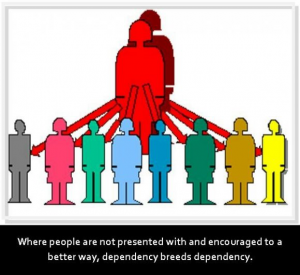Creating and Normalizing Dependency
6 April 2017
 There are various conditions in America that hinder many citizens from achieving all the good that might otherwise be possible in their living. Among the most destructive of these is that our nation has sadly become amazingly proficient in creating and normalizing dependency. That is, making people not only physically dependent on government, but mentally convinced that government has a responsibility to provide for needs that should reasonably be satisfied through individual effort.
There are various conditions in America that hinder many citizens from achieving all the good that might otherwise be possible in their living. Among the most destructive of these is that our nation has sadly become amazingly proficient in creating and normalizing dependency. That is, making people not only physically dependent on government, but mentally convinced that government has a responsibility to provide for needs that should reasonably be satisfied through individual effort.
I think creating dependency requires convincing people that they are at a disadvantage that government must remove or make adjustments that allow moving ahead, in spite of the disadvantage. An example of how this removing or adjusting looks can be found in an article titled, “New York To Scrap Literacy Test For Teachers In The Name Of Diversity” by Peter Hasson. Hasson reports that New York is moving toward scrapping the requirement that prospective teachers pass a basic reading and writing literacy exam. He writes, “The state’s Board of Regents is expected to ditch the Academic Literacy Skills Test in part because black and Hispanic teaching candidates struggled to pass the exam, according to the AP.” What New York is moving to do is the kind of action that says, “Don’t take on an attitude of working hard to meet standards. Government, or some other controlling entity, will lower the standard to allow you to qualify.”
I do not deny that there are instances where governmental action is necessary to rectify unacceptable conditions experienced by citizens. My concern is that various governmental entities intercede so routinely and often seemingly automatically take actions that relieve citizens of individual responsibility. In the New York teacher exam situation, lowering the standards, instead of determining why black and Hispanic candidates underperform, and addressing those causes is the kind of response that is routine now. This response, which is rampant across America, fosters the expectation of repeated relief from individual effort and responsibility. When people experience this treatment over time, it is only reasonable that far too many will come to a point of existence that makes dependence on government a way of life. This is the creation of dependency.
The absolutely scary condition is when the dependency model is normalized. That is, government in particular, and society in general, come to the point of routinely operating in a fashion that minimizes, or totally eliminates, the requirement for individual responsibility.
Normalization of the dependency model shows through in what is happening by way of efforts to involuntarily annex Shaw Heights and Julie Heights. These are neighborhoods surrounded by the City of Fayetteville, North Carolina, but are not part of the city. The area is referred to as a “doughnut hole” because of this situation. It is low income, with a high percentage of rental properties, and most homes are on a septic tank. Various reports indicate that Fayetteville has not annexed Shaw and Julie Heights because property taxes would not cover the cost of providing the services that would be required by annexation.
Is it so outrageous that a city would consider cost in deciding whether to annex an area? Estimates to install a required sewer, if Shaw and Julie Heights are annexed, run as high as $7 million. The current Fayetteville arrangement is that property owners in annexed areas pay $5000 toward the cost of making sewer service available. This does not cover the full cost of bringing service to an area. The balance is paid by the city and/or Public Works Commission (PWC). In 2005, Fayetteville annexed some 40,000 residents. The process of extending sewer service to those residents is still underway. The $5000 payment applies, but the remaining cost was initially shared by the city and PWC. The full amount of the additional cost was later shifted to PWC. A recent rate increase approved for the utility was, in part, justified by PWC having to pay the additional cost of providing sewer service to the annexed area.
Now consider my contention that the approach being pursued in annexing Shaw and Julie Heights reflects normalized dependency. That is, the dependency model is prevalent across America and presented with the situation in these neighborhoods, the response is to follow the model and press Fayetteville to annex the area. A major point of discussion is that property owners will have difficulty paying the $5000 sewer charge. My expectation is that financial relief would somehow be provided for homeowners, at the expense of taxpayers, outside the neighborhoods being annexed.
State Representative Elmer Floyd is proposing legislation that would add Shaw Heights and Julie Heights to Fayetteville. This would be forced annexation in that the residents of these areas, or of Fayetteville, do not get to vote on the matter. I think the following quotes from an article by Andrew Barksdale titled, “Filling the ‘doughnut hole’” speak to my contention that the apparent course of this annexation effort fits the dependency model:
“The bill’s primary sponsor, state Rep. Elmer Floyd, a Fayetteville Democrat, said it was time to bring Shaw Heights into the city. ‘It’s an area that has been discriminated against because of the residents,’ he said.”
“Joe Tolley, a long-time Shaw Heights resident and landlord, favors annexation and what would come with it —sewer, garbage collection and sidewalks. ‘We’re still suffering out here, and the city of Fayetteville could care less,’ he said, sitting in his office in a mobile home.”
“This week, the PWC’s legal interpretation on the sewer question was circulated to city officials. The PWC told The Fayetteville Observer the document was privileged legal advice and not a public record, but the newspaper obtained a copy from another source. The memo said that while state-initiated annexations don’t require PWC to pay for sewer, the utility acknowledged that the legislature could make such a requirement in the bill itself. ‘This exception is far from clear and we are not certain how a court would interpret it in this situation,’ the PWC memo said.”
These quotes from the Barksdale article fit the parameters of what I am calling the “Dependency Model.” The message is that the residents of Shaw Heights and Julie Heights have been and are mistreated. Granted, only one person is quoted, but my experience indicates the attitude of expecting relief at the expense of others is present. The PWC piece indicates there is at least concern that someone or some entity other than residents will shoulder the cost of running sewer to the area. Beyond the quotes, government is forcing this action on the citizens of those neighborhoods and of Fayetteville. These elements reflect the dependency model at work.
Given that I see use of the dependency model as destructive and totally unacceptable, one might reasonably ask what I offer as an alternative. In an article titled, “With revitalization efforts stalled, ‘Shaw Heights needs help’” posted on 25 July 2015, Andrew Barksdale wrote:
“Three years ago, then-Mayor Tony Chavonne had some out-of-the-box thinking of his own. He proposed that a portion of the $45 million parks bond package, which never went before voters, be used to put a sports field and a tennis center over 125 acres in Shaw Heights.”
Those years ago, when I became aware of the proposal to which Barksdale refers, I called Mayor Chavonne and asked him to tell me more about his thinking. He explained that since the planned 295-Bypass would cross Murchison Road just above Shaw Heights, having a sports complex would attract people to the area. With this would come restaurants, motels, and other job-producing businesses. Central to his idea was that residents of the Shaw Heights area would be trained for employment in those businesses. This approach would have provided opportunity for residents to improve their financial condition where necessary.
What Tony Chavonne proposed, and worked hard to achieve, ended up on the ever-growing trash heap of great ideas defeated by political bickering and grandstanding, along with adherence to the dependency model. My hope is that the day will come in Fayetteville, and across this nation, when, as the Chavonne approach very likely would have done, struggling citizens are given opportunities for becoming self-sufficient vice being dependent on government and, thereby, on taxpayers. Where people are not presented with and encouraged to a better way, dependency breeds dependency. If the Shaw Heights’ situation is addressed with this normal dependency model, we will almost certainly get more of what we have, except with water, sewer, and maybe sidewalks added. I think a visit to that trash heap of defeated and neglected great ideas is in order.





Leave a Reply